3 September – 1 December 2019
Spill
-
Lorna Brown
CuratorLorna Brown is a Vancouver-based visual artist, curator, writer and editor. Brown is a founding member of Other Sights for Artists’ Projects, and is an ongoing member of the Other Sights Producer team. She was the Director/Curator of Artspeak Gallery from 1999 to 2004, an artist-run centre focusing on the relationship between visual art and writing. Between 2015 and 2022, she was Acting Director/Curator at the Belkin, curating exhibition series such as Beginning With the Seventies that explored the relationship between art, archives and activism. Brown has exhibited her work internationally since 1984, and has taught at Simon Fraser University and Emily Carr University of Art and Design where she received an honorary doctorate of letters in 2015. Awards include the Vancouver Institute for the Visual Arts Award (1996) and the Canada Council Paris Studio Award (2000). Her work is in the collections of the Belkin, SFU Galleries, the National Gallery of Canada, the BC Arts Council, the Surrey Art Gallery and the Canada Council Art Bank.
Read More
-
Carolina Caycedo
ArtistBorn in London to Colombian parents, Carolina Caycedo (London, b.1978) is an artist involved in territorial resistance, solidarity economies sustained through community projects and housing as a human right. Contributing to the construction of environmental historical memory as a way of preventing violence against human and non-human entities, her work generates debate about the futures of shared resources, environmental justice, just energy transition and cultural biodiversity. Since 2012 she has developed Be Dammed, a body of work that focuses on communities affected by extractivist industries, such as the construction of dams and the privatization of water. Upcoming solo museum shows include Muzeum Sztuki (Łódź), Orange County Museum of Art (California) and ICA (Boston). In 2019 her work has been included in the 45 Salón Nacional de Artistas Colombia, the Chicago Architecture Biennial and Film Sector of Art Basel. She is an active member of the Los Angeles Tenants Union and the Rios VivosColombia social movement.
Read More
-
Nelly César
ArtistNelly César (Mexican, b. 1986) is an interdisciplinary artist exploring sculpture, installation and drawing in connection to performance. Her multifaceted experimental projects work to propose alternative ways of experiencing art, and to build stronger and more diverse artistic communities. César attempts to decolonize artistic and urban territories by reclaiming spaces and creating self-organizing structures outside of hegemonic economic and social systems. César’s commitment to constructing alternatives to institutional traditions is central to her work as the creative director and co-founder of Pandeo, an independent cultural centre in Mexico City. Pandeo creates new ways of thinking about public space and feminist practices, focusing on the interpersonal and affective interactions between the arts, audiences and creators. César is also a founding member of Prras!, an art and editorial project engaging with issues of labour, economy and professionalization for women in the arts.Her work has been shown in Mexico, Canada, Argentina, Hungary, France and the US, and is included in the Museo de Mujeres Artistas Mexicana and in Archiva: Masterpieces of Mexican Feminist Art by Mónica Mayer. César received her MFA from the University of British Columbia.
Read More
-
Guadalupe Martinez
ArtistGuadalupe Martinez (Argentinian, b. 1980) holds a BFA from IUNA (Buenos Aires, Argentina) and an MFA from University of British Columbia, in Vancouver. Her research in space and materiality, performance and pedagogy function as means to develop forms of somatic activism, healing, and embodied interventions through radical presence. Martinez is an active participant and creator of CUERPO, an ongoing research, collaboration and mentorship process articulated through performance. Most recently, in conjunction with Or Gallery, CUERPO took the form of a series of embodiment workshops which culminated in a public performance at Cathedral Square in downtown Vancouver (2019). Martinez has shown at the Vancouver Art Gallery’s FUSE, Griffin Art Projects, VIVO Media Arts Centre, Latitude 53 (Edmonton), Access Gallery, the Apartment, Satellite Gallery, and grunt gallery.
Read More
-
Teresa Montoya
ArtistTeresa Montoya (Diné, b. 1984) is a social scientist and media maker trained in socio-cultural anthropology, critical Indigenous studies and filmmaking. Drawing from Diné oral histories as well as ethnographic and archival practice, Montoya’s research and media production focuses on legacies of environmental contamination and settler colonialism in relation to contemporary issues of tribal jurisdiction and regulatory politics in the Indigenous Southwest. Her photographic and film work has been shown and published internationally, including in the Ethnographic Terminalia curatorial collective and Anthropology Now. In addition to her art practice, she has curatorial and education experience in various institutions, including the Peabody Essex Museum, the National Museum of the American Indian, and the Indian Arts Research Center at the School for Advanced Research, Santa Fe. She holds a PhD in Cultural Anthropology from New York University with a filmmaking certificate in Culture and Media. Montoya is a Provost’s Postdoctoral Fellow in the Department of Anthropology at the University of Chicago where she teaches courses in Native American and Indigenous Studies.
Read More
-
Anne Riley
ArtistAnne Riley is a multidisciplinary artist living as an uninvited Slavey Dene/German guest from Fort Nelson First Nation on the unceded territories of the xʷməθkʷəy̓əm, Sḵwx̱wú7mesh and Sel̓íl̓witulh Nations. Her work explores different ways of being and becoming, touch and Indigeneity. Riley received her BFA from the University of Texas at Austin in 2012 and has exhibited across the United States and Canada. From 2018 to 2020, she worked on a public art project commissioned by the City of Vancouver with her collaborator, T’uy’t’tanat Cease Wyss. Riley and Wyss’s project, A Constellation of Remediation, consisted of Indigenous remediation gardens planted throughout the city. Riley and Wyss were longlisted for the 2021 Sobey Art Award. Since this project, Riley participated in the Drift: Art and Dark Matter residency and exhibition, creating works that consider the possibilities of making and being beyond the confines of Western institutions and extractive processes.
Read More
-
Genevieve Robertson
ArtistGenevieve Robertson (Canadian, b. 1984) is an interdisciplinary artist with a background in environmental studies. Her drawings are often comprised of found organic materials collected on-site, and map a visceral and long-term engagement with specific regions. Through recent research in the Kootenays, the Salish Sea and the Fraser and Columbia rivers, she has engaged with the complexities that emerge when relating to land and water in a time of large-scale industrial exploitation and climate precarity. Her process-based studio work is rooted in inquisitive conversation, long-term place-based exploration and being out on the shoreline. Robertson has shown at venues including at the Libby Leshgold Gallery at Emily Carr University of Art and Design, the Pensacola Museum (Florida), Touchstones Museum (Nelson), Or Gallery (Vancouver), the New Gallery (Calgary) and Walter Phillips Gallery, Banff Centre. She holds an MFA from Emily Carr University (2016) and a BFA from NSCAD University (2009).
Read More
-
Susan Schuppli
ArtistSusan Schuppli (Swiss-Canadian, b. 1967) is an artist and researcher based in London whose work examines material evidence from war and conflict to environmental disasters. In particular she investigates the challenges that contaminated environments pose for making truth claims that turn on the legal question of direct causality. Her artistic process involves working directly with scientists and lawyers, often bringing different materials and perspectives together to create new critical vantage points or to produce a counter narrative. Creative projects have been exhibited throughout Europe, Asia, Canada, and the US.She has published widely in media and politics and received the ICP Infinity Award for Critical Writing and Research in 2016. Her book, MATERIAL WITNESS: Media • Forensics • Evidence,will be published by MIT Press in 2020. Schuppli holds a PhD in Cultural Studies and Research Architecture from Goldsmiths University of London, and participated in the Whitney Independent Study Program after completing her MFA at the University of California San Diego. Currently, she is the Director of the Centre for Research Architecture and Board Chair of Forensic Architecture at Goldsmiths.
Read More
-
Susan Schuppli
ArtistSusan Schuppli (Swiss-Canadian, b. 1967) is an artist and researcher based in London whose work examines material evidence from war and conflict to environmental disasters. In particular she investigates the challenges that contaminated environments pose for making truth claims that turn on the legal question of direct causality. Her artistic process involves working directly with scientists and lawyers, often bringing different materials and perspectives together to create new critical vantage points or to produce a counter narrative. Creative projects have been exhibited throughout Europe, Asia, Canada, and the US.She has published widely in media and politics and received the ICP Infinity Award for Critical Writing and Research in 2016. Her book, MATERIAL WITNESS: Media • Forensics • Evidence,will be published by MIT Press in 2020. Schuppli holds a PhD in Cultural Studies and Research Architecture from Goldsmiths University of London, and participated in the Whitney Independent Study Program after completing her MFA at the University of California San Diego. Currently, she is the Director of the Centre for Research Architecture and Board Chair of Forensic Architecture at Goldsmiths.
Read More
Reception: Thursday, October 17 from 6 to 9 pm
Tours: Ongoing from September 3, information here.
Involving installations, live research, performance and radio programming, Spill is curated by Lorna Brown and presents work by Carolina Caycedo, Nelly César, Guadalupe Martinez, Teresa Montoya, Anne Riley, Genevieve Robertson, Susan Schuppli and T’uy’t’tanat Cease Wyss. Spill: Response, curated by Guadalupe Martinez, re-centres the gallery as a site for embodiment, with visiting artist César in collaboration with Riley and Wyss. Throughout the project, Spill: Radio, curated by Tatiana Mellema, will present radio episodes in collaboration with CiTR 101.9 FM.
Installations by Caycedo, Montoya, Robertson and Schuppli focus on our continental waters and the conditions of their impaired movement, contamination and political rights. Susan Schuppli’s Nature Represents Itself (2018) examines the Deepwater Horizon accident through a simulated image based on the properties of the hydrocarbon atoms of the escaped crude oil. Releasing millions of computational particles assigned as oil or water through gaming software, the video loop is combined with audio sourced from the lawsuit against BP filed by Ecuador on behalf of the rights of nature. Genevieve Robertson presents work from her ongoing project Still Running Water (2017) which follows the Columbia River from source to mouth. Her video installation holds both the presence and absence of the dammed river, as reservoirs empty to reveal drowned forests and former habitations. Gravity acting on silty water is captured by Robertson in a drawing on large sheets of paper. Carolina Caycedo’s Serpent River Book (2017) gathers images and texts from the artist’s work in Colombian, Brazilian and Mexican communities affected by the industrialization and privatization of river systems. This performative book can be unfolded and pleated in multiple formations creating new meandering pathways and meanings. Teresa Montoya’s work critically engages with photography as she uses it to trace millions of gallons of acidic mine waste discharged into the San Juan River that flows across the Navajo Nation. Yellow Water (2016) is one of many projects that posit territorial dispossession and environmental toxicity as pervasive features of contemporary Indigenous life—while affirming how communities are sustained through water in landscapes in which it is scarce. Together, these installations invite integrated layers of real-time research and performance.
Spill: Response, 16-23 October 2019
Curated by Guadalupe Martinez, the live research and performance component brings together activists, performance artists and educators whose practices deeply consider relationships between the body, the land and forms of pedagogy that engage with healing, love and sustainability as collaborative methodologies. Visiting artist Nelly César will collaborate with Maria Thereza Alves, Anne Riley and Cease Wyss within the Belkin Gallery and surrounding locations on the unceded Musqueam, Squamish and Tsleil-Waututh territories. Extending their activities into local sites such as the UBC Farm, the Fraser River and sites of protest, the artists will present talks, workshops and performances over the course of the visit.
Spill: Radio, New episodes aired Tuesdays from 10 to 11 am
Curated by Tatiana Mellema in collaboration with CiTR 101.9 FM, the radio program will present weekly podcast episodes that anticipate, extend and enrich the themes of Spill. Rather than educational supplement, the radio platform will provide its own critical space of praxis moving towards collective research. Interviews, readings, performances and field recordings will offer insight into artistic processes engaged with the land, territory, extraction and embodied performance. These episodes will carry forward influential work by artists, writers and community organizers – ranging from those resisting the Transmountain Pipeline expansion to artistic practices that engage with soundscapes of the land.
Image (above): Genevieve Robertson, Still Running Water (still), 2017.
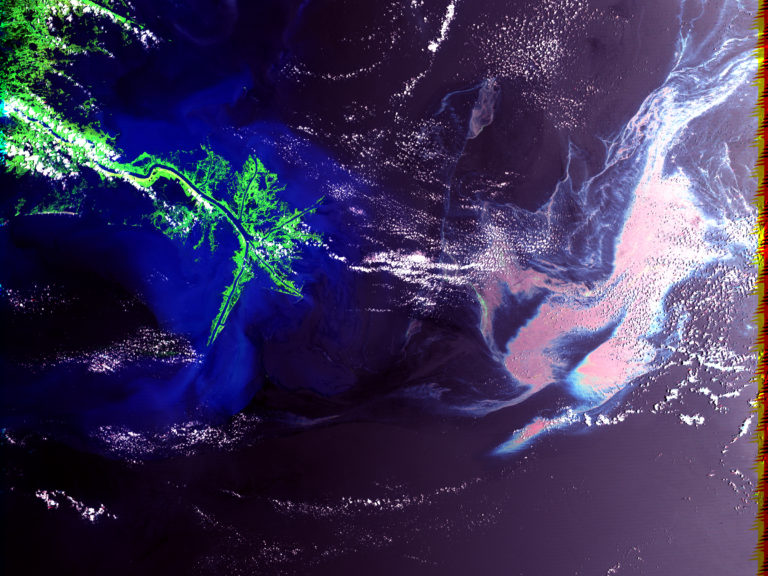
Susan Schuppli, Nature Represents Itself (detail), 2018.
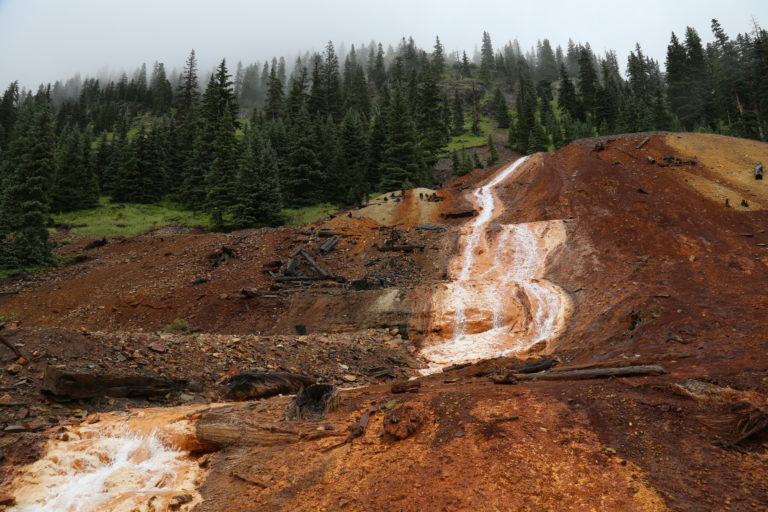
Teresa Montoya, Yellow Water, 2016.
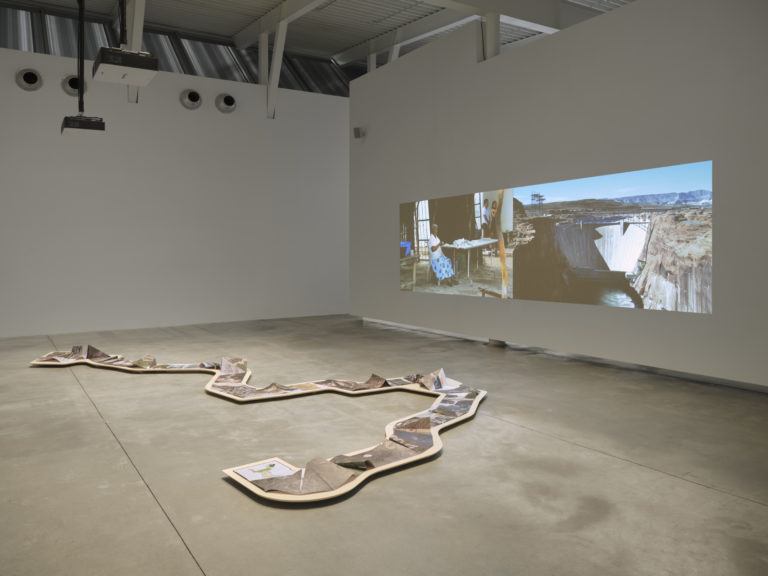
Left to right: Carolina Caycedo, Serpent River Book, 2017, artist book; and Carolina Caycedo, To Stop Being a Threat and To Become a Promise, 2017, 2-channel video.
Photo: Rachel Topham Photography
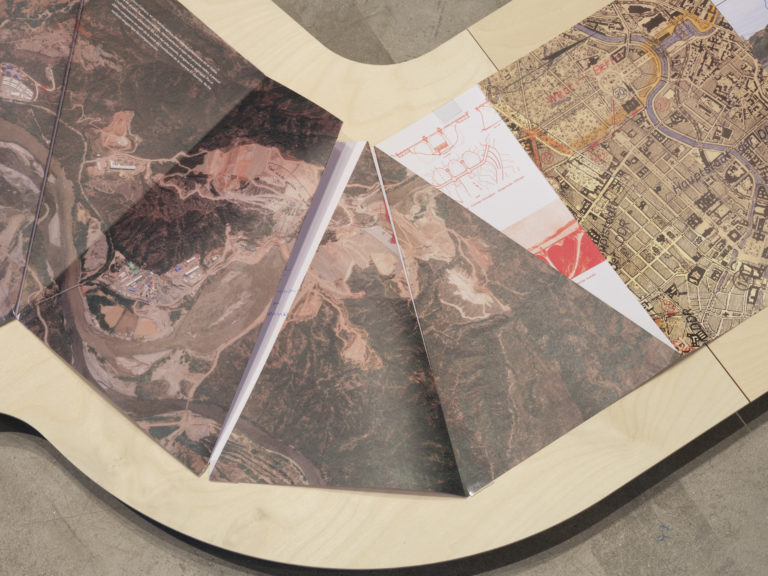
Carolina Caycedo, Serpent River Book (detail), 2017
Photo: Rachel Topham Photography
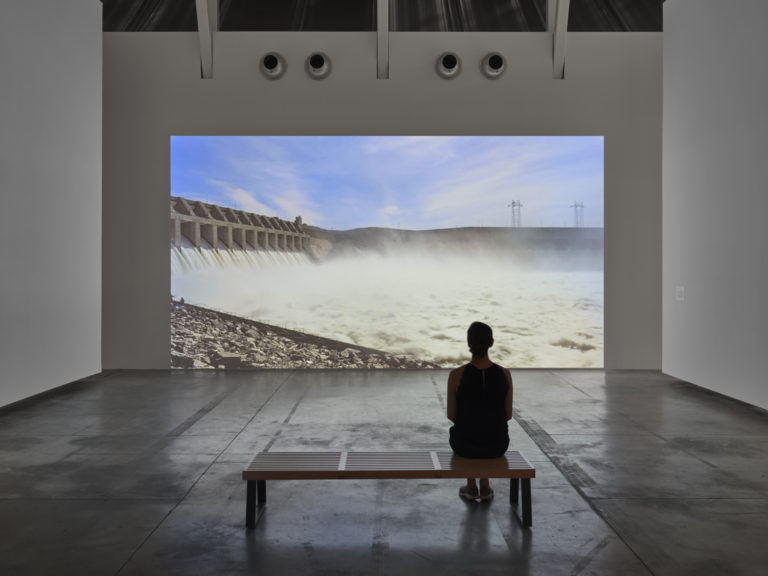
Genevieve Robertson, Still Running Water, 2017, video.
Photo: Rachel Topham Photography
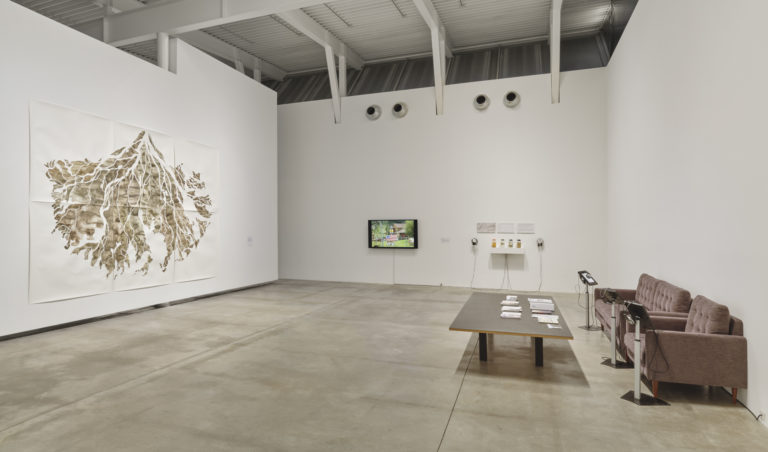
Installation view, Spill (3 September-1 December 2019), at the Morris and Helen Belkin Art Gallery, University of British Columbia. Left to right: Genevieve Robertson, Alluvial Fan, 2019, silt collected from the Kinbasket, Rosevelt, McNarry and Wanapum reservoirs along the Columbia River on paper; Teresa Montoya, Yellow Water, 2016, digital photographs, water samples and sound recording.
Photo: Rachel Topham Photography
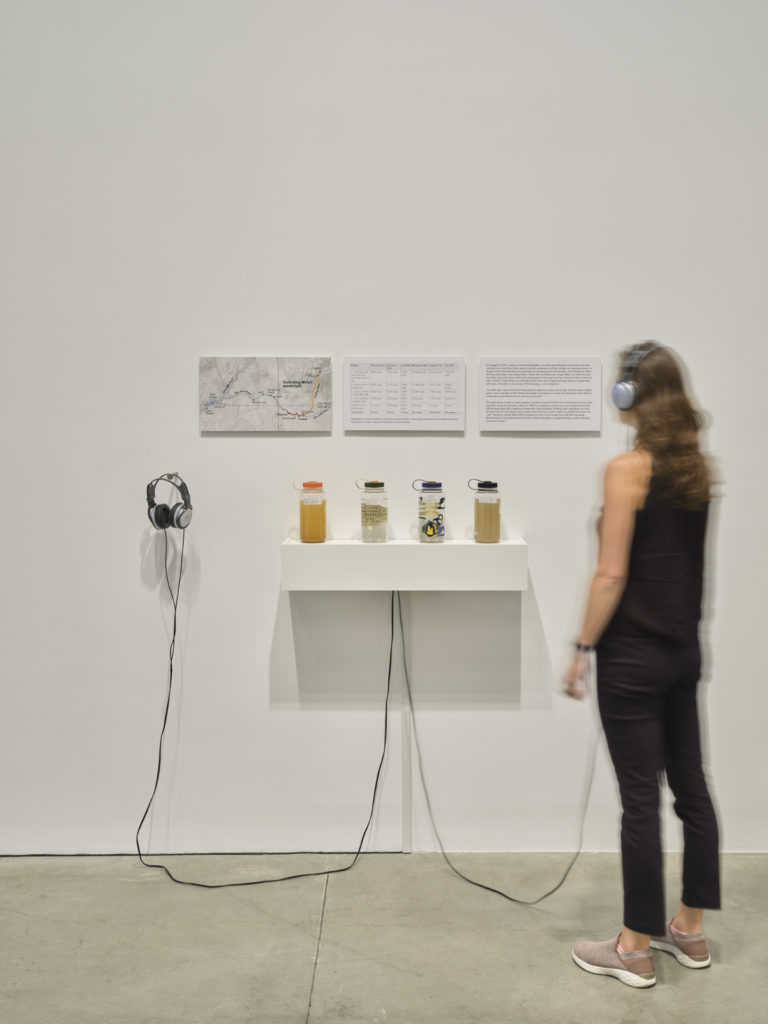
Teresa Montoya, Yellow Water (detail), 2016, digital photographs and water samples.
Photo: Rachel Topham Photography
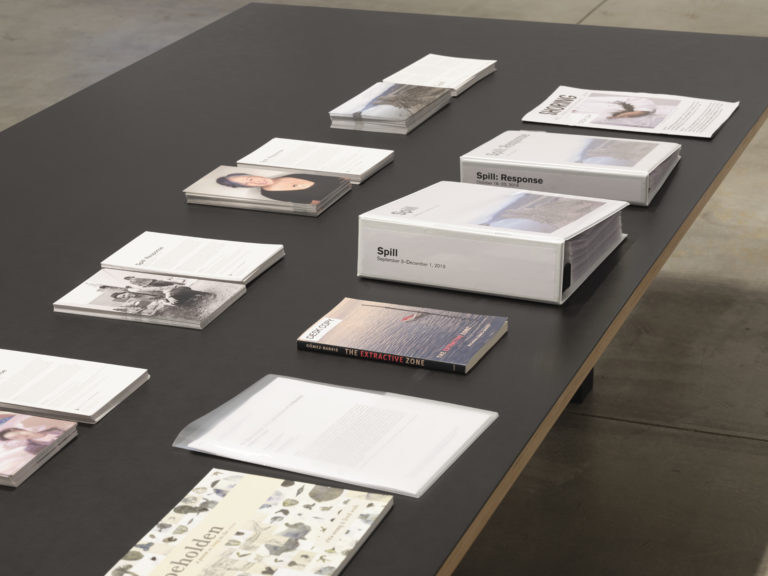
Installation view, Spill (3 September-1 December 2019), at the Morris and Helen Belkin Art Gallery, University of British Columbia.
Photo: Rachel Topham Photography
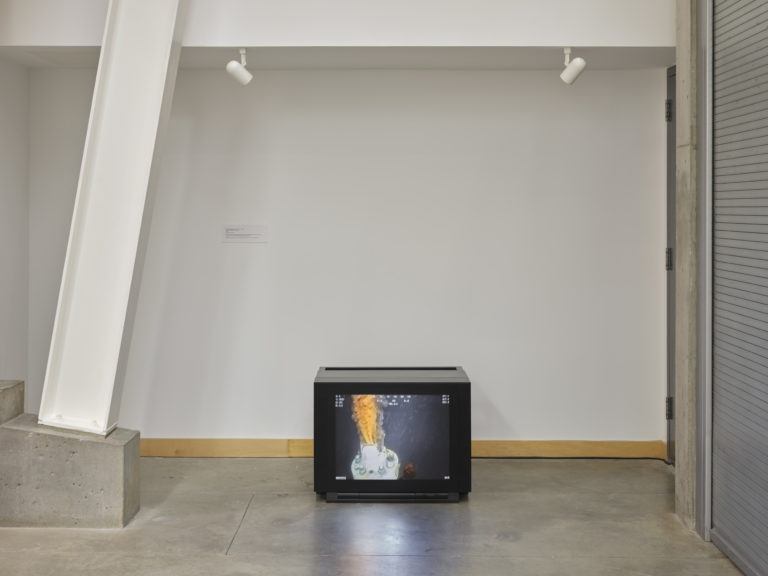
Susan Schuppli, Nature Represents Itself (detail), 2018, installation with video, audio and digital photographs.
Photo: Rachel Topham Photography
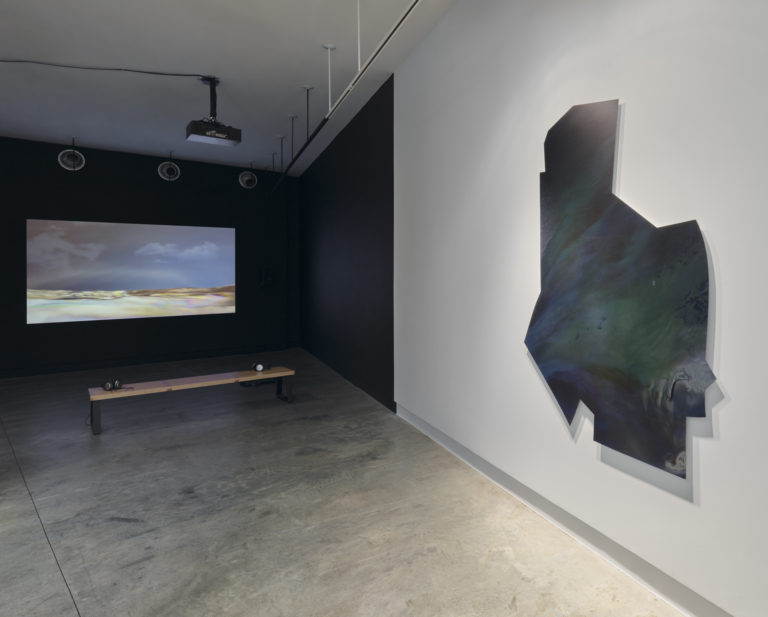
Susan Schuppli, Nature Represents Itself (detail), 2018, installation with video, audio and digital photographs.
Photo: Rachel Topham Photography
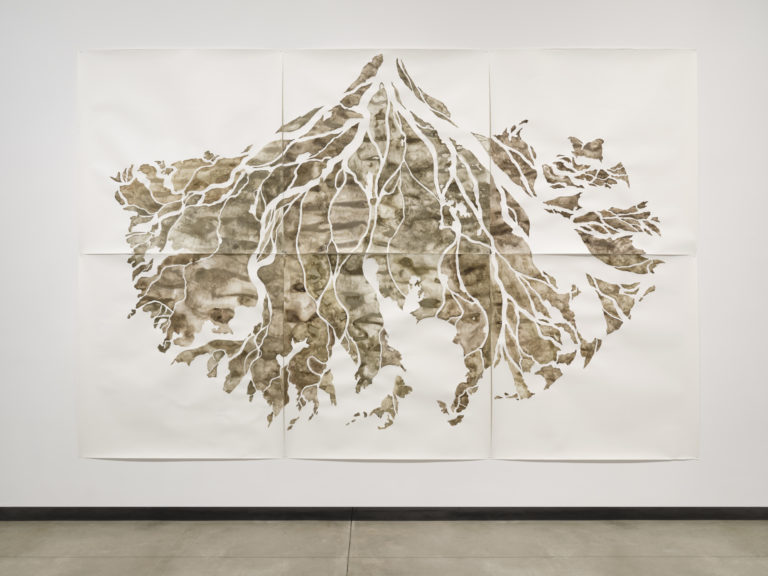
Genevieve Robertson, Alluvial Fan, 2019, silt collected from the Kinbasket, Rosevelt, McNarry and Wanapum reservoirs along the Columbia River on paper.
Photo: Rachel Topham Photography
-
Lorna Brown
CuratorLorna Brown is a Vancouver-based visual artist, curator, writer and editor. Brown is a founding member of Other Sights for Artists’ Projects, and is an ongoing member of the Other Sights Producer team. She was the Director/Curator of Artspeak Gallery from 1999 to 2004, an artist-run centre focusing on the relationship between visual art and writing. Between 2015 and 2022, she was Acting Director/Curator at the Belkin, curating exhibition series such as Beginning With the Seventies that explored the relationship between art, archives and activism. Brown has exhibited her work internationally since 1984, and has taught at Simon Fraser University and Emily Carr University of Art and Design where she received an honorary doctorate of letters in 2015. Awards include the Vancouver Institute for the Visual Arts Award (1996) and the Canada Council Paris Studio Award (2000). Her work is in the collections of the Belkin, SFU Galleries, the National Gallery of Canada, the BC Arts Council, the Surrey Art Gallery and the Canada Council Art Bank.
Read More
-
Carolina Caycedo
ArtistBorn in London to Colombian parents, Carolina Caycedo (London, b.1978) is an artist involved in territorial resistance, solidarity economies sustained through community projects and housing as a human right. Contributing to the construction of environmental historical memory as a way of preventing violence against human and non-human entities, her work generates debate about the futures of shared resources, environmental justice, just energy transition and cultural biodiversity. Since 2012 she has developed Be Dammed, a body of work that focuses on communities affected by extractivist industries, such as the construction of dams and the privatization of water. Upcoming solo museum shows include Muzeum Sztuki (Łódź), Orange County Museum of Art (California) and ICA (Boston). In 2019 her work has been included in the 45 Salón Nacional de Artistas Colombia, the Chicago Architecture Biennial and Film Sector of Art Basel. She is an active member of the Los Angeles Tenants Union and the Rios VivosColombia social movement.
Read More
-
Nelly César
ArtistNelly César (Mexican, b. 1986) is an interdisciplinary artist exploring sculpture, installation and drawing in connection to performance. Her multifaceted experimental projects work to propose alternative ways of experiencing art, and to build stronger and more diverse artistic communities. César attempts to decolonize artistic and urban territories by reclaiming spaces and creating self-organizing structures outside of hegemonic economic and social systems. César’s commitment to constructing alternatives to institutional traditions is central to her work as the creative director and co-founder of Pandeo, an independent cultural centre in Mexico City. Pandeo creates new ways of thinking about public space and feminist practices, focusing on the interpersonal and affective interactions between the arts, audiences and creators. César is also a founding member of Prras!, an art and editorial project engaging with issues of labour, economy and professionalization for women in the arts.Her work has been shown in Mexico, Canada, Argentina, Hungary, France and the US, and is included in the Museo de Mujeres Artistas Mexicana and in Archiva: Masterpieces of Mexican Feminist Art by Mónica Mayer. César received her MFA from the University of British Columbia.
Read More
-
Guadalupe Martinez
ArtistGuadalupe Martinez (Argentinian, b. 1980) holds a BFA from IUNA (Buenos Aires, Argentina) and an MFA from University of British Columbia, in Vancouver. Her research in space and materiality, performance and pedagogy function as means to develop forms of somatic activism, healing, and embodied interventions through radical presence. Martinez is an active participant and creator of CUERPO, an ongoing research, collaboration and mentorship process articulated through performance. Most recently, in conjunction with Or Gallery, CUERPO took the form of a series of embodiment workshops which culminated in a public performance at Cathedral Square in downtown Vancouver (2019). Martinez has shown at the Vancouver Art Gallery’s FUSE, Griffin Art Projects, VIVO Media Arts Centre, Latitude 53 (Edmonton), Access Gallery, the Apartment, Satellite Gallery, and grunt gallery.
Read More
-
Teresa Montoya
ArtistTeresa Montoya (Diné, b. 1984) is a social scientist and media maker trained in socio-cultural anthropology, critical Indigenous studies and filmmaking. Drawing from Diné oral histories as well as ethnographic and archival practice, Montoya’s research and media production focuses on legacies of environmental contamination and settler colonialism in relation to contemporary issues of tribal jurisdiction and regulatory politics in the Indigenous Southwest. Her photographic and film work has been shown and published internationally, including in the Ethnographic Terminalia curatorial collective and Anthropology Now. In addition to her art practice, she has curatorial and education experience in various institutions, including the Peabody Essex Museum, the National Museum of the American Indian, and the Indian Arts Research Center at the School for Advanced Research, Santa Fe. She holds a PhD in Cultural Anthropology from New York University with a filmmaking certificate in Culture and Media. Montoya is a Provost’s Postdoctoral Fellow in the Department of Anthropology at the University of Chicago where she teaches courses in Native American and Indigenous Studies.
Read More
-
Anne Riley
ArtistAnne Riley is a multidisciplinary artist living as an uninvited Slavey Dene/German guest from Fort Nelson First Nation on the unceded territories of the xʷməθkʷəy̓əm, Sḵwx̱wú7mesh and Sel̓íl̓witulh Nations. Her work explores different ways of being and becoming, touch and Indigeneity. Riley received her BFA from the University of Texas at Austin in 2012 and has exhibited across the United States and Canada. From 2018 to 2020, she worked on a public art project commissioned by the City of Vancouver with her collaborator, T’uy’t’tanat Cease Wyss. Riley and Wyss’s project, A Constellation of Remediation, consisted of Indigenous remediation gardens planted throughout the city. Riley and Wyss were longlisted for the 2021 Sobey Art Award. Since this project, Riley participated in the Drift: Art and Dark Matter residency and exhibition, creating works that consider the possibilities of making and being beyond the confines of Western institutions and extractive processes.
Read More
-
Genevieve Robertson
ArtistGenevieve Robertson (Canadian, b. 1984) is an interdisciplinary artist with a background in environmental studies. Her drawings are often comprised of found organic materials collected on-site, and map a visceral and long-term engagement with specific regions. Through recent research in the Kootenays, the Salish Sea and the Fraser and Columbia rivers, she has engaged with the complexities that emerge when relating to land and water in a time of large-scale industrial exploitation and climate precarity. Her process-based studio work is rooted in inquisitive conversation, long-term place-based exploration and being out on the shoreline. Robertson has shown at venues including at the Libby Leshgold Gallery at Emily Carr University of Art and Design, the Pensacola Museum (Florida), Touchstones Museum (Nelson), Or Gallery (Vancouver), the New Gallery (Calgary) and Walter Phillips Gallery, Banff Centre. She holds an MFA from Emily Carr University (2016) and a BFA from NSCAD University (2009).
Read More
-
Susan Schuppli
ArtistSusan Schuppli (Swiss-Canadian, b. 1967) is an artist and researcher based in London whose work examines material evidence from war and conflict to environmental disasters. In particular she investigates the challenges that contaminated environments pose for making truth claims that turn on the legal question of direct causality. Her artistic process involves working directly with scientists and lawyers, often bringing different materials and perspectives together to create new critical vantage points or to produce a counter narrative. Creative projects have been exhibited throughout Europe, Asia, Canada, and the US.She has published widely in media and politics and received the ICP Infinity Award for Critical Writing and Research in 2016. Her book, MATERIAL WITNESS: Media • Forensics • Evidence,will be published by MIT Press in 2020. Schuppli holds a PhD in Cultural Studies and Research Architecture from Goldsmiths University of London, and participated in the Whitney Independent Study Program after completing her MFA at the University of California San Diego. Currently, she is the Director of the Centre for Research Architecture and Board Chair of Forensic Architecture at Goldsmiths.
Read More
-
Susan Schuppli
ArtistSusan Schuppli (Swiss-Canadian, b. 1967) is an artist and researcher based in London whose work examines material evidence from war and conflict to environmental disasters. In particular she investigates the challenges that contaminated environments pose for making truth claims that turn on the legal question of direct causality. Her artistic process involves working directly with scientists and lawyers, often bringing different materials and perspectives together to create new critical vantage points or to produce a counter narrative. Creative projects have been exhibited throughout Europe, Asia, Canada, and the US.She has published widely in media and politics and received the ICP Infinity Award for Critical Writing and Research in 2016. Her book, MATERIAL WITNESS: Media • Forensics • Evidence,will be published by MIT Press in 2020. Schuppli holds a PhD in Cultural Studies and Research Architecture from Goldsmiths University of London, and participated in the Whitney Independent Study Program after completing her MFA at the University of California San Diego. Currently, she is the Director of the Centre for Research Architecture and Board Chair of Forensic Architecture at Goldsmiths.
Read More
Funders
We gratefully acknowledge the generous support of the Canada Council for the Arts, the Province of British Columbia through the BC Arts Council and our Belkin Curator’s Forum members.
Related
-
Tour
3 September 2019-1 December 2019
Tours: Spill
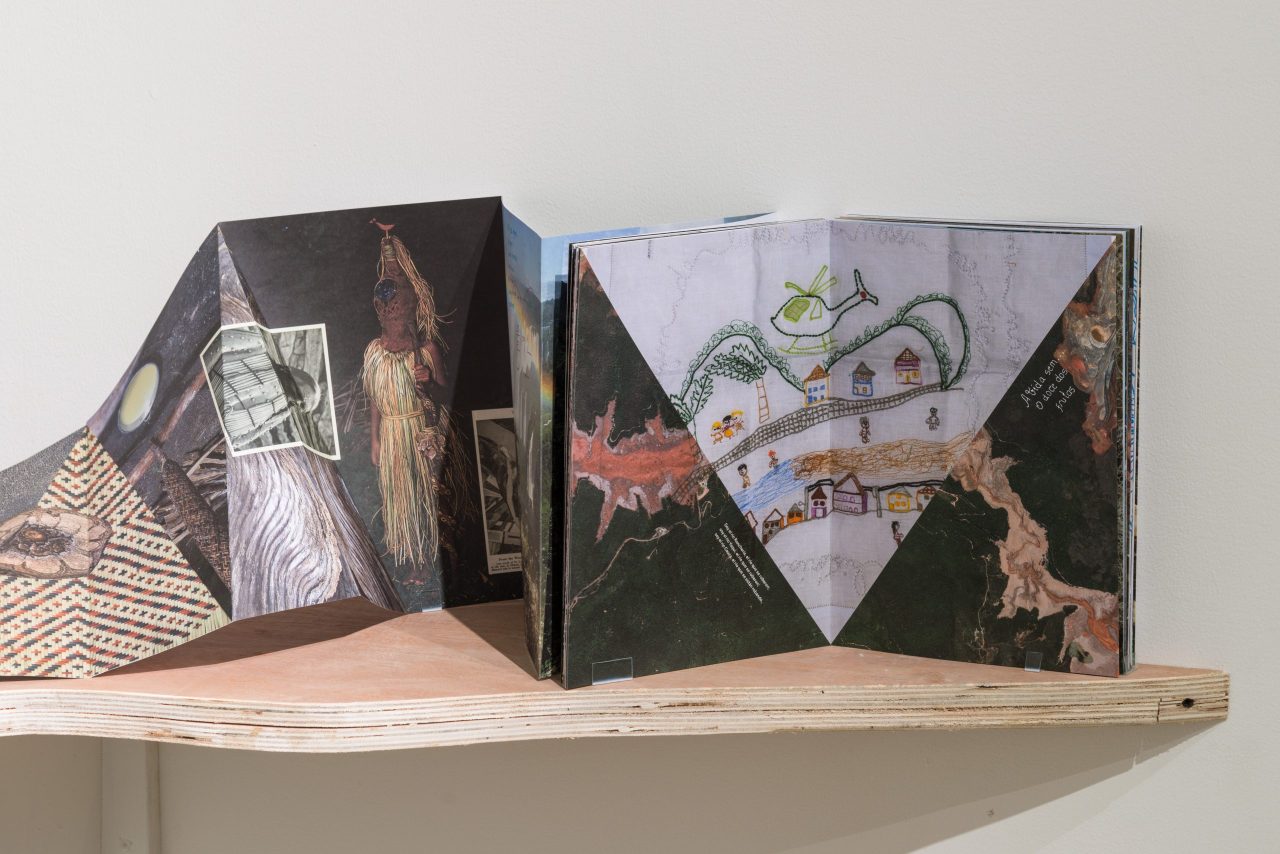
Tours and discussions of Spill can be arranged from Tuesday to Friday for groups and classes, lasting 50 minutes and longer. For more information, please contact Belkin Public Programs by email at belkin.tours@ubc.ca or by phone at (604) 822-5600. Drop-in tours are available on Saturday and Sunday between 12:30 and 4 pm beginning Saturday, September 28. Drop-in tours are casual and conversational, lasting about 15 to 30 minutes. These can be arranged the day-of at the Reception Desk or ahead of time by calling (604) 822-4883.
[more] -
Event
New episodes every week on Tuesdays, from 3 September-26 November 2019
Spill: Radio
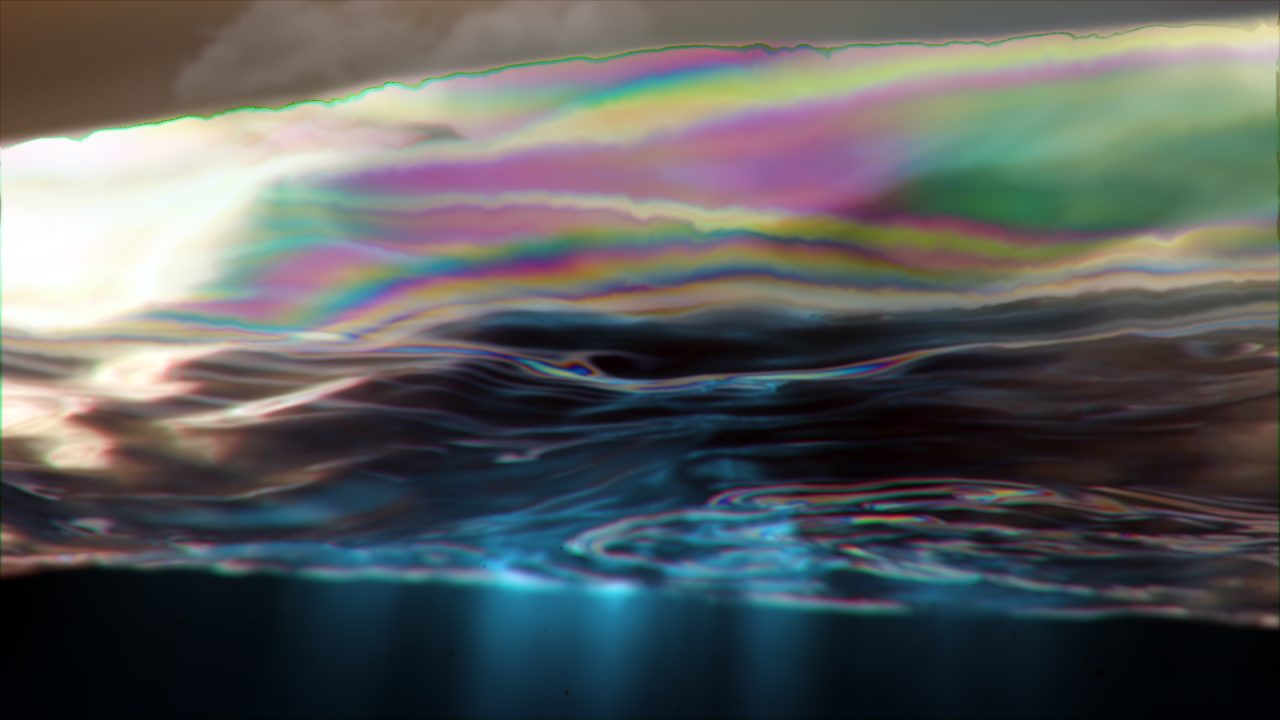
Spill: Radio is a weekly radio show and podcast that anticipates, extends and enriches the themes of the Spill exhibition. For each week of Spill, interviews, readings, performances and field recordings offer insight into artistic processes engaged with the land, territory, extraction and embodied performance. This project engages radio as a site for the relational study of ecosystems and their processes that register the hyper-financialization of the biosphere’s resources. Destabilizing vision as the privileged mode of understanding, Spill Radio seeks to practice ways of listening to the intangible, the submerged and the sensuous in order to imagine and think with our world more complexly. Spill: Radio is curated by Tatiana Mellema and is presented in collaboration with CiTR 101.9 FM. Episodes for each week of the Spill exhibition will be aired on Tuesdays at 10 am on CiTR 101.9 FM and made available for you to download.
[more] -
Event
16-23 October 2019
Spill: Response
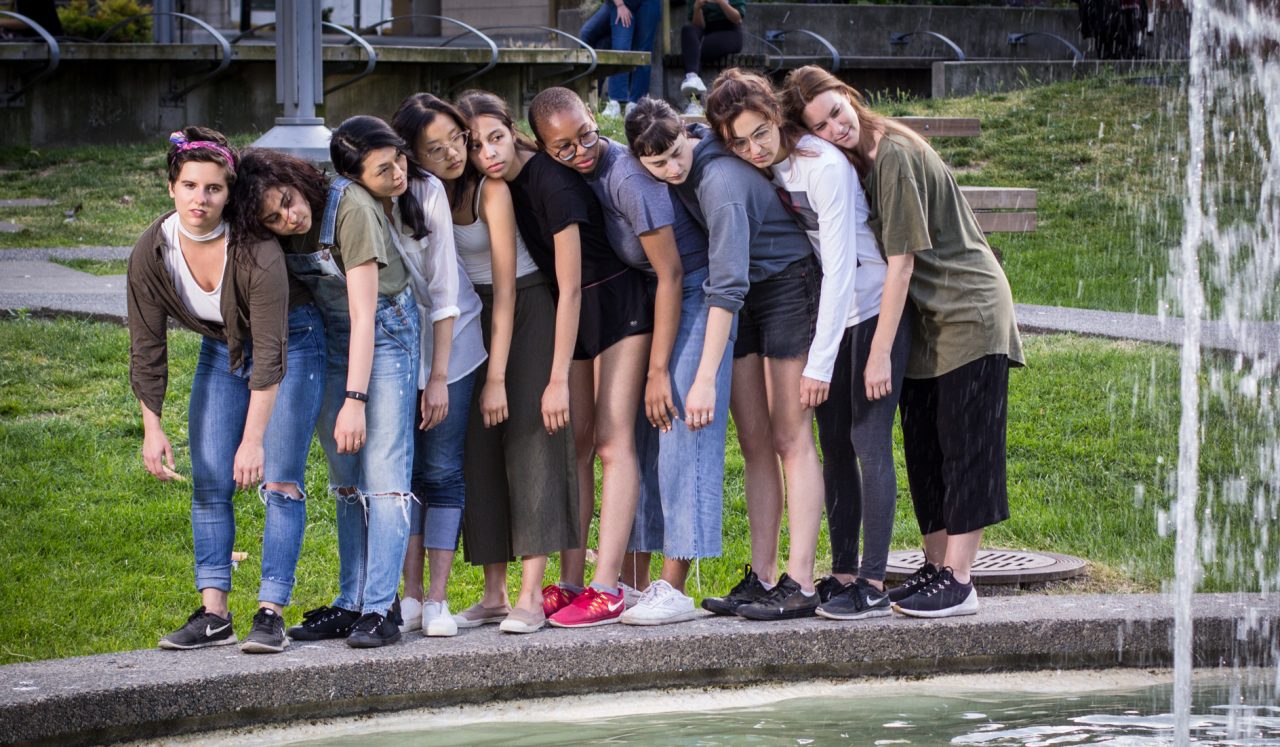
Curated by Guadalupe Martinez and part of the Spill exhibition at the Belkin (September 3–December 1, 2019), this live research and performance component brings together activists, performance artists and educators whose practices consider relationships between the body, the land and forms of pedagogy that engage with healing, love and sustainability as core to their methodologies. Spill: Response performs an extension of artists Maria Thereza Alves, Nelly César, Anne Riley, Cease Wyss and Guadalupe Martinez’s artistic practices where histories of protection of the land across the Americas may intertwine and be animated in the present. Working with a group of selected students, the artists will present their research and share their knowledge at the Belkin and surrounding locations on the unceded Musqueam, Squamish and Tsleil-Waututh territories.
[more] -
Event
Wed 27 November 2019, 2 pm
Concert at the Belkin: Spill
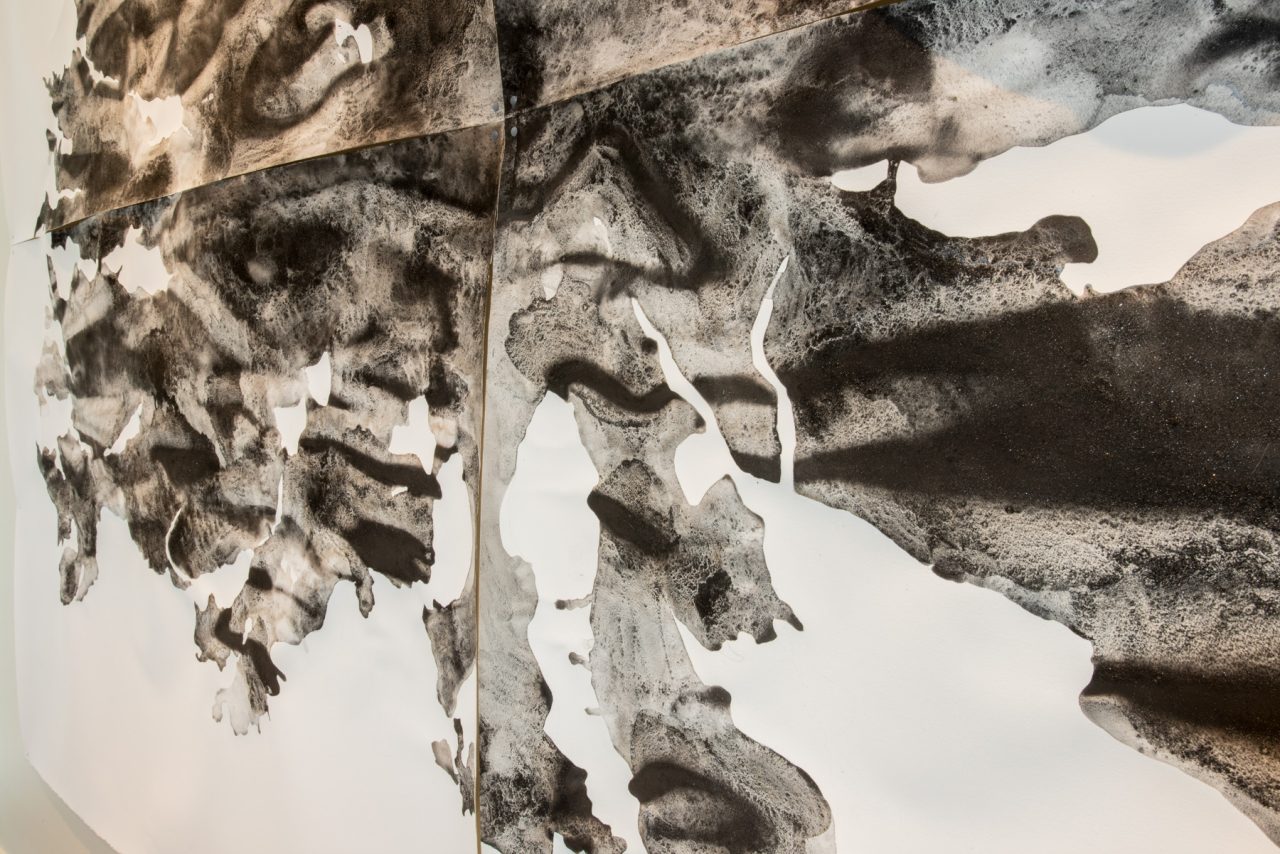
We are excited to welcome the UBC Contemporary Players back to the Belkin Art Gallery for a concert inspired by the exhibition Spill. Led by director Paolo Bortolussi, this graduate and undergraduate student ensemble from the UBC School of Music will animate the Gallery for an afternoon program exploring our relationship to continental waters, their impaired movement, contamination and political rights.
[more] -
Research Project
2021 - Ongoing
Ars Scientia: Merging Artistic Practice with Scientific Research
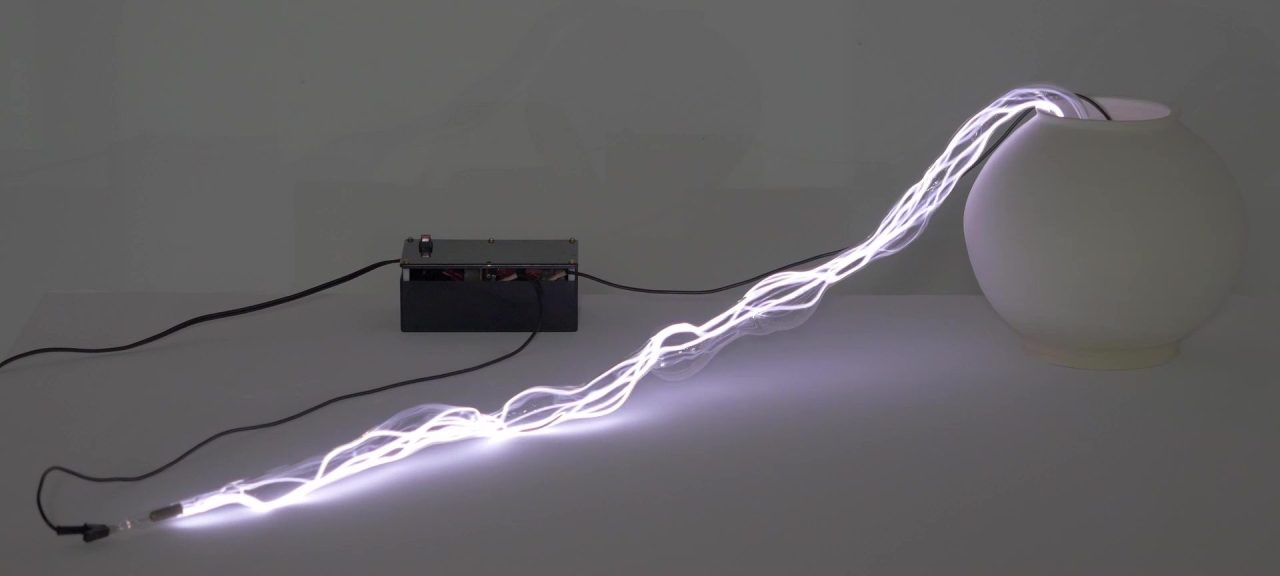
The long search for dark matter has put the spotlight on the limitations of human knowledge and technological capability. Confronted with the shortcomings of our established modes of detecting, diagnosing and testing, the search beckons the creation of new ways of learning and knowing. Fusing the praxes of arts and science in the emergent fields of interdisciplinary research, Ars Scientia, a tripartite partnership between UBC's Stewart Blusson Quantum Matter Institute (Blusson QMI), the Department of Physics and Astronomy and the Belkin, presents an opportunity to foster new modes of knowledge exchange across the arts, sciences and their pedagogies. Funded by UBC’s Research Excellence Cluster program, Ars Scientia will conduct rich programming and research to address this line of inquiry over the next two years beginning in 2021.
[more]